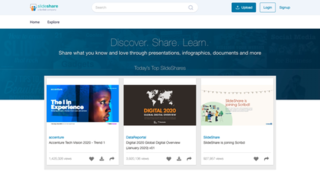Related Research Articles

StumbleUpon was a browser extension, toolbar, and mobile app with a "Stumble!" button that, when pushed, opened a semi-random website or video that matched the user's interests, similar to a random web search engine. Users were able to filter results by type of content and were able to discuss such webpages via virtual communities and were able to rate such webpages via like buttons. StumbleUpon was shut down in June 2018.

Flickr is an image hosting and video hosting service, as well as an online community, founded in Canada and headquartered in the United States. It was created by Ludicorp in 2004 and was a popular way for amateur and professional photographers to host high-resolution photos. It has changed ownership several times and has been owned by SmugMug since April 20, 2018.
Google Video was a free video hosting service, originally launched by Google on January 25, 2005.
Vimeo, Inc. is an American video hosting, sharing, and services platform provider headquartered in New York City. Vimeo focuses on the delivery of high-definition video across a range of devices. Vimeo's business model is through software as a service (SaaS). They derive revenue by providing subscription plans for businesses and content creators. Vimeo provides its subscribers with tools for video creation, editing, and broadcasting, enterprise software solutions, as well as the means for video professionals to connect with clients and other professionals. As of December 2021, the site has 260 million users, with around 1.6 million subscribers to its services.
Justin.tv was a website created by Justin Kan, Emmett Shear, Michael Seibel, and Kyle Vogt in 2007 to allow anyone to broadcast video online. Justin.tv user accounts were called "channels", like those on YouTube, and users were encouraged to broadcast a wide variety of user-generated live video content, called "broadcasts".

Seesmic was a suite of freeware web, mobile, and desktop applications which allowed users to simultaneously manage user accounts for multiple social networks, such as Facebook and Twitter.

YouTube is an American online video-sharing platform headquartered in San Bruno, California, founded by three former PayPal employees—Chad Hurley, Steve Chen, and Jawed Karim– in February 2005. Google bought the site in November 2006 for US$1.65 billion, since which it operates as one of Google's subsidiaries.

AVG Technologies is a brand of cybersecurity, privacy, performance and utility software applications for desktop computers and mobile devices developed by Avast, a part of Gen Digital. AVG was a cybersecurity software company founded in 1991 and it merged into Avast following an acquisition in 2017. It typically offers freeware, earning revenues from advertisers and from users that upgrade to paid versions for access to more features.

Drop.io was an online file sharing service. It allowed users to quickly create "drops", which could contain files of any type, and could be accessed via the internet, e-mail, phone, fax, and widgets. The service did not require users to sign up for an account, and each drop was private unless the creator chose to share it. Drop.io was named one of Time magazine's 50 Best Websites of 2009, and CNET Webware 100.

Rounds is a video-enabled real-time social network with collaborative browsing, chat, multi-player gaming and built-in social recommendation features that can be expanded through an open API. Rounds was founded by Israeli entrepreneurs Dany Fishel, Ilan Leibovich and Dimitry Shestek in February 2008. Fishel is Rounds' CEO and Ilan Leibovich is the company COO. The company is based in Tel Aviv, Israel.
Causes is a for-profit civic-technology app and website that enables users to organize grassroots and public-awareness campaigns. Causes is a website that gives summaries of breaking news, new laws, and popular topics. Users can respond, comment, share, or contact their representatives about an issue. Users can also create their own "Cause" and seek support from other users.

Docstoc was an electronic document repository and online store, aimed at providing professional, financial and legal documents for the business community. It closed in 2015. Users could upload, share and sell their own documents, or purchase professional documents written in-house by professionals and lawyers.

Facebook is a social networking service originally launched as TheFacebook on February 4, 2004, before changing its name to simply Facebook in August 2005. It was founded by Mark Zuckerberg and college roommates and fellow Harvard University students, in particular Eduardo Saverin, Andrew McCollum, Dustin Moskovitz, and Chris Hughes. The website's membership was initially limited by the founders to Harvard students, but was expanded to other colleges in the Boston area, the Ivy League, and gradually most universities in the United States and Canada, corporations, and by September 2006, to everyone with a valid email address along with an age requirement of being 13 or older.

SlideShare is an American hosting service, now owned by Scribd, for professional content including presentations, infographics, documents, and videos. Users can upload files privately or publicly in PowerPoint, Word, PDF, or OpenDocument format. Content can then be viewed on the site itself, on mobile devices or embedded on other sites. SlideShare also provides users the ability to rate, comment on, and share the uploaded content. Launched on October 4, 2006, the service positioned itself to be similar to YouTube, but for presentations. The company was acquired by LinkedIn in 2012, and then by Scribd in 2020.

Google+ was a social network that was owned and operated by Google until 2019. The network was launched on June 28, 2011, in an attempt to challenge other social networks, linking other Google products like Google Drive, Blogger and YouTube. The service, Google's fourth foray into social networking, experienced strong growth in its initial years, although usage statistics varied, depending on how the service was defined. Three Google executives oversaw the service, which underwent substantial changes that led to a redesign in November 2015.

A like button, like option, or recommend button is a feature in communication software such as social networking services, Internet forums, news websites and blogs where the user can express that they like, enjoy or support certain content. Internet services that feature like buttons usually display the number of users who liked each content, and may show a full or partial list of them. This is a quantitative alternative to other methods of expressing reaction to content, like writing a reply text. Some websites also include a dislike button, so the user can either vote in favor, against or neutrally. Other websites include more complex web content voting systems. For example, five stars or reaction buttons to show a wider range of emotion to the content.

Vine was an American short-form video hosting service where users could share six-second-long looping video clips. It was originally launched on January 24, 2013, by Vine Labs, Inc. Bought by Twitter, Inc. in 2012 before its launch, the service was shut down on January 17, 2017, and the app was discontinued a few months later.
An online video platform (OVP) enables users to upload, convert, store, and play back video content on the Internet, often via a private server structured, large-scale system that may generate revenue. Users will generally upload video content via the hosting service's website, mobile or desktop application, or other interfaces (API),and typically provides embed codes or links that allow others to view the video content.

BlogTV was a live-streaming video blog service reintroduced by MadCow Disease Media LLC, in January 2016. BlogTV was first established in Ramat Gan, Israel in January 2004 by founders Ilan Ben-Dov, Dan Chen, Guy Eliav, Nir Ofir, and Oren Levy as a webcasting company. The service operated under the Tapuz brand. BlogTV's goals were to provide a means for anyone with Internet access to express their talents and ideas to the world. In 2006 BlogTV launched its Canadian activity under the name BlogTV.ca. BlogTV.com was officially launched in June 2007 in the US and the rest of the world. Users could create live video shows, interact with their audiences or invite co-hosts to join their show over the internet or by using WAP. The broadcasters were able to broadcast to their audience with a webcam. The platform also included a chat system. The site had a promotional partnership with ICQ, an IM platform. YouNow acquired BlogTV.com on March 13, 2013.
References
- ↑ "Vidly: Twitvid.io Changes Names, Direction, And Gets Funding". TechCrunch. 28 August 2009. Retrieved 24 January 2013.
- ↑ "Create Your Own Private YouTube With Fliggo". Mashable. 25 February 2009. Retrieved 24 January 2013.
- ↑ "Y Combinator Startup Fliggo Lets You Build Your Own YouTube". Tech Crunch. 25 February 2009. Retrieved 24 January 2013.